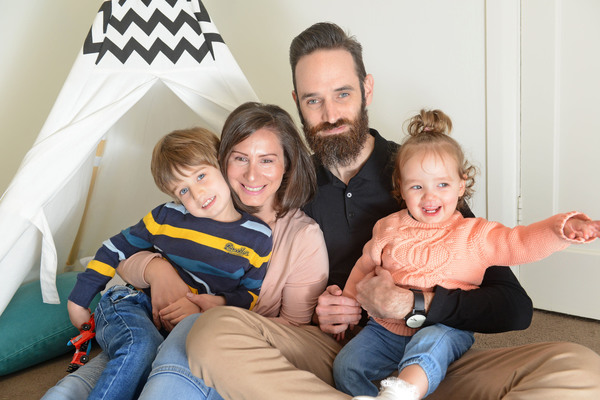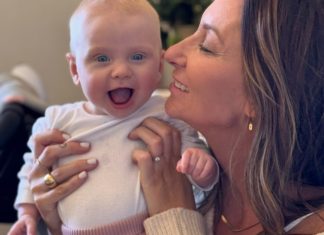In the weeks after her daughter’s birth, Hawthorn mother of two Josephine Smyth started noticing the familiar feelings of anxiety and darkness creep in.
She knew she needed to seek help.
Having experienced post natal depression with her son, Leo, she knew what to look out for and that it was more than just a hormonal shift or transition into life with two young children.
Here, she opens up to Melissa Meehan about her experience with post natal depression and the important work of Perinatal Anxiety and Depression Australia (PANDA).
“Lily would have been about four months old, because I had it before I recognised the feelings that I was having and I think what contributed to it this time was that Lily wasn’t a good sleeper,” Josie explained.
“It was fine for about 12 weeks, but then when you’re operating on no sleep and trying to run a household and manage a toddler at the same time, there’s no opportunity for rest.
“It got to a point I was up very hour overnight. I basically became a zombie, and so I started to have feelings, and I already had anxiety, and the anxious symptoms were heightened.
“I started not caring for myself. I had no appetite, I started not showering, I was feeling flat.
“I had inability to laugh at things I used to find funny. I started to get panicky and there was the really low feelings of dreading the day, not having any joy.”
It got to a point where Josie couldn’t sleep much at all.
That’s when the “scary thoughts” crept in.
“That’s when I realised it was different to normal feelings, where we are getting into scary territory,” she said.
Josie sought help from her GP, who knew her history of PND with Leo.
With Leo, her mum encouraged her to seek help, but this time Josie flagged it as soon as she recognised the same feelings.
It was recommended Josie be put on medication and continue to see a psychologist as well as a psychiatrist.
And while she knew the medication was an important step in her recovery, it was important to ensure it wouldn’t impact her breastfeeding journey with Lily.
This time around, Josie found herself being more open within her support network about what she was struggling with.
“I had a lot of family and friends come over and just sit with me, and that was really helpful,” she said.
“Having someone there – I could be myself, I didn’t have to put on a show.
“Whilst I was experiencing these symptoms I was faking it, and that is so hard. It’s really exhausting when you’re already exhausted as it is and you have to put on a face.
“It was nice being myself and not being judged.”
These days, Josie is comforted by the fact that PND seems to be a topic that’s being spoken about more.
It’s talked about more, written and spoken about more in the media, and there’s more support than ever.
“When I started to recover with Leo, I started to be more honest with my friends so I explained that time when I wasn’t myself, this was why,” she said.
Before Josie was first diagnosed after Leo’s birth back in 2014, she didn’t know much about depression and anxiety.
She was touched by the level of support after her second experience with PND.
“The responses I received were so supportive and compassionate,” she said.
Reflecting on her journey to date, she’s saddened by the fact she had no idea what to look out for during her pregnancies.
“It was all about the baby and all the fun things, and nothing about the flipside, nothing about the feelings you can experience.”
She hopes by sharing her story, anyone who is struggling may find the courage to speak up, just like she did.
“People need to know that if they are struggling or if the are worried about someone they don’t need a diagnosis – they can call PANDA’s hotline,” she said.
“Even if you think you might have symptoms or even if you are struggling a bit, they are a really good listening ear and then they can guide you.
PANDA has trained counsellors who can provide you with support, information and referrals if you are experiencing mental health challenges in pregnancy and new parenthood.”
– with Danielle Galvin
If you need help, call the PANDA hotline (Mon to Fri, 9am – 7.30pm AEST) on 1300 726 306 or visit www.panda.org.au/
Other contacts:
Lifeline 13 11 14 www.lifeline.org.au
beyondblue support service line 1300 22 46 36








